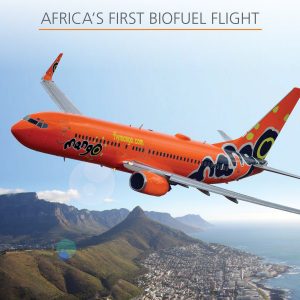In tandem with Boeing’s 100th anniversary and celebrations worldwide, the company, along with South African Airways (SAA) and Mango, flew their first passenger flight with renewable biojet fuel. The flight flew 300 passengers from Johannesburg to Cape Town on a Boeing 737-800s using a blend of 30 percent aviation biofuel produced from Solaris, a nicotine-free tobacco plant. The biojet fuel was produced by Sunchem, refined by AltAir Fuels and supplied by SkyNRG.
 “SAA is committed to a sustainable future and this flight highlights the bold steps we are taking to protect and preserve our environment while creating opportunities for the economic development of our people,” said Musa Zwane, acting CEO of SAA. “We are pleased to join the ranks of global airlines who have made a commitment to a better and cleaner way of flying.”
“SAA is committed to a sustainable future and this flight highlights the bold steps we are taking to protect and preserve our environment while creating opportunities for the economic development of our people,” said Musa Zwane, acting CEO of SAA. “We are pleased to join the ranks of global airlines who have made a commitment to a better and cleaner way of flying.”
Back in 2013, Boeing and SAA launched their sustainable aviation fuels collaboration. Then in 2014 Project Solaris became the first project that focused on converting oil from the Solaris plant seed into biojet fuel. Following in 2015, farms in Limpopo Province of South Africa, from which the biofuel for the inaugural flight was sourced, achieved certification from the Roundtable on Sustainable Biomaterials (RSB). The initiative is not only designed to reduce climate impact in the air, but is also designed to improve the health of South Africans and provide rural development, economics and employment opportunities for farmers through the production of Solaris and other sustainable feedstocks.
“It is fitting that on our 100 year anniversary we are flying on fuels that not only power the flight, but ensure a sustainable future for our industry,” added Miguel Santos, managing director for Africa, Boeing International. “This project is a great example of environmental stewardship that delivers economic and health benefits to South Africa.”
The partners also launched a stakeholder and sustainability plan called the Southern Africa Sustainable Fuel Initiative (SASFI) to ensure a long-term domestic fuel supply for SAA and other regional fuel users. The goal is to scale-up over the next several years to gain additional biofuel capacity. If successful, farmers will be able to tap into local and global demand for certified feedstock without adverse impact to food supplies, fresh water or land use.

